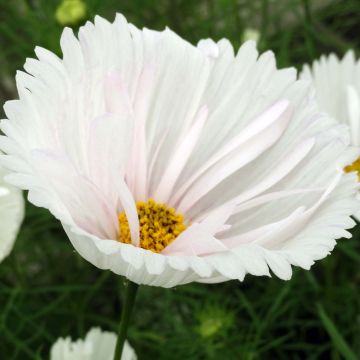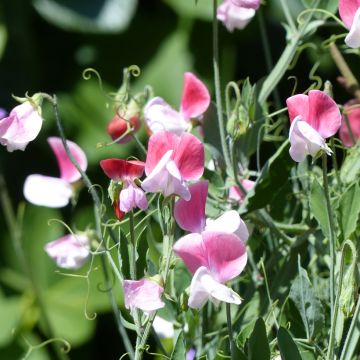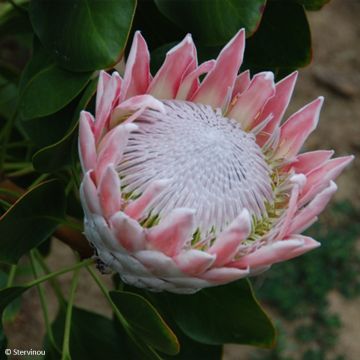

Cosmos bipinnatus Double Click Rose Bonbon Seeds


Cosmos bipinnatus Double Click Rose Bonbon Seeds


Cosmos bipinnatus Double Click Rose Bonbon Seeds
Cosmos bipinnatus Double Click Rose Bonbon Seeds
Cosmos x bipinnatus Double Click Rose Bonbon
Garden Cosmos, Mexican Aster
The seeds didn't germinate, but I was told that my soil was too heavy for successful direct sowing.
ELIANE A., 30/10/2017
Special offer!
Receive a €20 voucher for any order over €90 (excluding delivery costs, credit notes, and plastic-free options)!
1- Add your favorite plants to your cart.
2- Once you have reached €90, confirm your order (you can even choose the delivery date!).
3- As soon as your order is shipped, you will receive an email containing your voucher code, valid for 3 months (90 days).
Your voucher is unique and can only be used once, for any order with a minimum value of €20, excluding delivery costs.
Can be combined with other current offers, non-divisible and non-refundable.
Home or relay delivery (depending on size and destination)
Schedule delivery date,
and select date in basket
This plant carries a 6 months recovery warranty
More information
We guarantee the quality of our plants for a full growing cycle, and will replace at our expense any plant that fails to recover under normal climatic and planting conditions.
Would this plant suit my garden?
Set up your Plantfit profile →
Description
Cosmos 'Double Click Rose Bonbon' is an amazing selection featuring fully double, pompom-like blooms on strong stems. The charming pink flowers appear all season long on tall plants, ideal for cutting! Easy to grow and effortlessly romantic, Cosmos thrive in light soil in a sunny position.
Cosmos bipinnatus is a tender annual plant native to Mexico and the southernmost part of the United States. It belongs to the Asteraceae family alongside Dahlias and daisies, featuring the characteristic inflorescences known as capitulums and very fine, feathery foliage. 'Double Click Rose Bonbon' quickly forms large clumps, about 90 cm tall and 50 cm wide. Flowering starts in June-July, 60-90 days after sowing, and lasts until October (or the first frosts). The flower heads measure about 7 cm across and are made up of several layers of petals arranged around a golden central disc. The fully double flowers are straight-coloured, in a gentle shade of pink. Cosmos are a magnet to foraging insects and butterflies, including the monarch butterfly. The finely cut, cloud-like foliage resembles fennel leaves and is delicately scented. Flowers are followed by blackish, spiky seed heads (achenes).
Cosmos is an easy-going, rewarding annual that can single handedly fill a sunny slope, border or flower bed. It is perfect to animate romantic or cottage style gardens. Easy to grow even by beginners, this adorable plant with its feathery green leaves and naive flowers bring light and airiness to heavier blooms such as Dahlias. It combines well with perennial sage, Verbena bonariensis and chrysanthemums until the first frosts. It is particularly useful in new gardens mixed with poppies, love-in-a-mist or cornflowers. Its pretty blooms have a long vase life and are ideal for cutting.
Report an error about the product description
Cosmos bipinnatus Double Click Rose Bonbon Seeds in pictures


Flowering
Foliage
Plant habit
Botanical data
Cosmos
x bipinnatus
Double Click Rose Bonbon
Asteraceae
Garden Cosmos, Mexican Aster
Cultivar or hybrid
Other Cosmos seeds
View all →Planting and care
Sow Cosmos seeds from March to May, at a depth of 3mm, in a fine compost and cover the seeds with a very light sprinkle of vermiculite. Place the seed tray in a mini-greenhouse at a temperature of 18-25°C or wrap it in a polyethylene bag. Keep the soil moist but not waterlogged.
Light promotes germination, which occurs 7 to 15 days after sowing. When the seedlings are large enough to handle, transplant them into individual pots with a diameter of 7cm.
Cultivate them in cooler conditions until the plants are sufficiently developed to be planted outdoors. When all risk of frost has passed, gradually acclimate the plants to outdoor conditions for 7 to 10 days.
Plant them in full sun, in a moist, well-drained soil, spaced 45cm apart. Pinch the tips of the shoots on each stem during transplantation to encourage branching and the production of numerous flowers.
Cosmos prefer soil with a pH between 6 and 8.5, corresponding to the soil of their native habitat, the alkaline regions of Central America. They prefer full sun but tolerate partial shade. These plants are drought-tolerant once established, they are not very susceptible to diseases but can be targeted by aphids. Spontaneous seedlings are common, but not always true to type, without becoming invasive.
Sowing period
Intended location
-
, onOrder confirmed
Reply from on Promesse de fleurs
Similar products
Haven't found what you were looking for?
Hardiness is the lowest winter temperature a plant can endure without suffering serious damage or even dying. However, hardiness is affected by location (a sheltered area, such as a patio), protection (winter cover) and soil type (hardiness is improved by well-drained soil).

Photo Sharing Terms & Conditions
In order to encourage gardeners to interact and share their experiences, Promesse de fleurs offers various media enabling content to be uploaded onto its Site - in particular via the ‘Photo sharing’ module.
The User agrees to refrain from:
- Posting any content that is illegal, prejudicial, insulting, racist, inciteful to hatred, revisionist, contrary to public decency, that infringes on privacy or on the privacy rights of third parties, in particular the publicity rights of persons and goods, intellectual property rights, or the right to privacy.
- Submitting content on behalf of a third party;
- Impersonate the identity of a third party and/or publish any personal information about a third party;
In general, the User undertakes to refrain from any unethical behaviour.
All Content (in particular text, comments, files, images, photos, videos, creative works, etc.), which may be subject to property or intellectual property rights, image or other private rights, shall remain the property of the User, subject to the limited rights granted by the terms of the licence granted by Promesse de fleurs as stated below. Users are at liberty to publish or not to publish such Content on the Site, notably via the ‘Photo Sharing’ facility, and accept that this Content shall be made public and freely accessible, notably on the Internet.
Users further acknowledge, undertake to have ,and guarantee that they hold all necessary rights and permissions to publish such material on the Site, in particular with regard to the legislation in force pertaining to any privacy, property, intellectual property, image, or contractual rights, or rights of any other nature. By publishing such Content on the Site, Users acknowledge accepting full liability as publishers of the Content within the meaning of the law, and grant Promesse de fleurs, free of charge, an inclusive, worldwide licence for the said Content for the entire duration of its publication, including all reproduction, representation, up/downloading, displaying, performing, transmission, and storage rights.
Users also grant permission for their name to be linked to the Content and accept that this link may not always be made available.
By engaging in posting material, Users consent to their Content becoming automatically accessible on the Internet, in particular on other sites and/or blogs and/or web pages of the Promesse de fleurs site, including in particular social pages and the Promesse de fleurs catalogue.
Users may secure the removal of entrusted content free of charge by issuing a simple request via our contact form.
The flowering period indicated on our website applies to countries and regions located in USDA zone 8 (France, the United Kingdom, Ireland, the Netherlands, etc.)
It will vary according to where you live:
- In zones 9 to 10 (Italy, Spain, Greece, etc.), flowering will occur about 2 to 4 weeks earlier.
- In zones 6 to 7 (Germany, Poland, Slovenia, and lower mountainous regions), flowering will be delayed by 2 to 3 weeks.
- In zone 5 (Central Europe, Scandinavia), blooming will be delayed by 3 to 5 weeks.
In temperate climates, pruning of spring-flowering shrubs (forsythia, spireas, etc.) should be done just after flowering.
Pruning of summer-flowering shrubs (Indian Lilac, Perovskia, etc.) can be done in winter or spring.
In cold regions as well as with frost-sensitive plants, avoid pruning too early when severe frosts may still occur.
The planting period indicated on our website applies to countries and regions located in USDA zone 8 (France, United Kingdom, Ireland, Netherlands).
It will vary according to where you live:
- In Mediterranean zones (Marseille, Madrid, Milan, etc.), autumn and winter are the best planting periods.
- In continental zones (Strasbourg, Munich, Vienna, etc.), delay planting by 2 to 3 weeks in spring and bring it forward by 2 to 4 weeks in autumn.
- In mountainous regions (the Alps, Pyrenees, Carpathians, etc.), it is best to plant in late spring (May-June) or late summer (August-September).
The harvesting period indicated on our website applies to countries and regions in USDA zone 8 (France, England, Ireland, the Netherlands).
In colder areas (Scandinavia, Poland, Austria...) fruit and vegetable harvests are likely to be delayed by 3-4 weeks.
In warmer areas (Italy, Spain, Greece, etc.), harvesting will probably take place earlier, depending on weather conditions.
The sowing periods indicated on our website apply to countries and regions within USDA Zone 8 (France, UK, Ireland, Netherlands).
In colder areas (Scandinavia, Poland, Austria...), delay any outdoor sowing by 3-4 weeks, or sow under glass.
In warmer climes (Italy, Spain, Greece, etc.), bring outdoor sowing forward by a few weeks.
















































